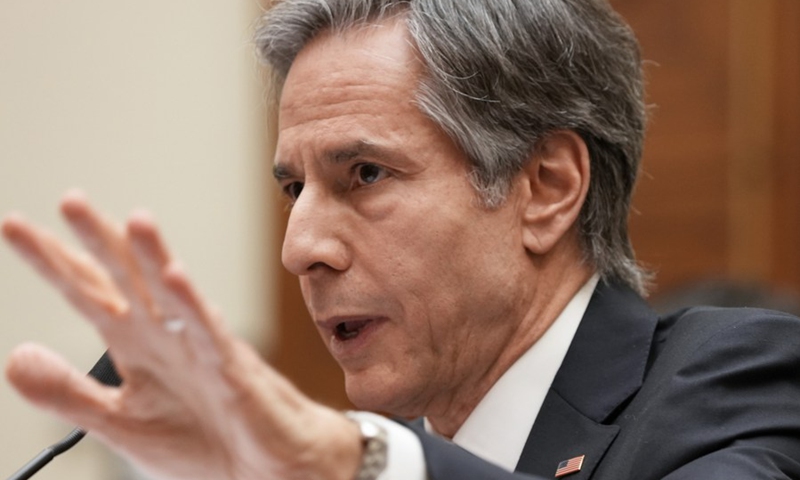Blinken's Africa visit seeks to compete with China, Russia; attempt may end up being futile

US Secretary of State Antony Blinken Photo: Xinhua
US Secretary of State Antony Blinken's visit to Ethiopia and Niger, the latest in a series of visits to Africa by senior Biden administration officials, exposed the US intention of competing with China and Russia over influence in the region. However, experts warned that Washington's attempt may be futile, as discord between the US and Ethiopia is yet to be resolved, and being forced to take sides is not welcome in the region.
Blinken arrived late Tuesday in Ethiopia, which marked the highest-ranking US visit to the country since conflict broke out in late 2020 between the Ethiopian government and the rebel Tigray People's Liberation Front (TPLF).
When meeting with Ethiopian Prime Minister Abiy Ahmed, Blinken praised Ethiopia on Wednesday for its progress in implementing a peace deal to end the Tigray conflict, but stopped short of ushering the country back into a US trade program.
During the conflict, the US accused the Ethiopian government of possible war crimes and suspended Ethiopia's participation in an accord that offered duty-free access for most of its exports, which frayed Washington's ties with Addis Ababa.
Over the past few years, attacks have surged in the region, where the borders of Burkina Faso, Mali and Niger converge, threatening the health and safety of a hard-hit civilian population.
Choosing Ethiopia and Niger as destinations for the visit sends a clear signal that Washington is seeking a bigger influence in the continent so that it can compete with China and Russia, said Song Wei, a professor at the school of international relations and diplomacy at Beijing Foreign Studies University. She explained that Ethiopia, Africa's second most populous nation, has numerous economic and political cooperation projects with China, while Niger has close ties with Russia in military cooperation.
Blinken's visit to Addis Ababa, the capital of Ethiopia, with a bid to support the peace process, came after Chinese Foreign Minister Qin Gang's visit to the country in January this year.
During a press conference in Ethiopia, Qin said that China has always believed that the conflict in the Tigray Region is an internal affair of Ethiopia and that the Ethiopian people have the wisdom and ability to independently resolve their internal differences; China has always respected Ethiopia's sovereignty and territorial integrity and supported the Ethiopian government and people's efforts to achieve national peace, unity and development; China has always supported African people in solving African problems in African ways.
Molly Phee, the top US diplomat for Africa, said that Blinken's visit would aim to "help consolidate that peace" but cautioned that the US-Ethiopian relationship was not ready to go "back to normal."
She said that Ethiopia needed to take steps "to help break the cycle of ethnic political violence" if it wants to put the US relationship back on a "forward trajectory."
The sharp contrast in attitudes laid bare the fundamental difference between China and the US policies on Africa, said Song. The US has always insisted on imposing its solution roadmap on African countries in resolving their domestic issues.
If those African countries refuse to follow, the US will then wield the weapon of sanctions to punish them. This does not help ease tensions, and is the reason more and more African people are coming round to the fact of US interference, said experts.
Apart from interfering with their domestic issues, African countries are also growing wary of being forced by the US to take sides in big power competition.
African Union Commission chairperson Moussa Faki Mahamat was quoted by media as saying in January that Africa, which was brutally colonized by European powers for centuries, is no one's pawn. "Africa refuses to be seen as an arena for influence struggles," said the continent's top diplomat. "We are open to cooperation and partnerships with everyone, as long as they respect our principles, our priorities and our interests."
China has always viewed African countries as equal partners for cooperation, but the US only thinks of Africa when other countries' cooperation with African nations catches Washington's attention, so in some way, the US is always looking for an imaginary enemy in Africa, but has never truly cared about the wellbeing of those countries, said Song.


